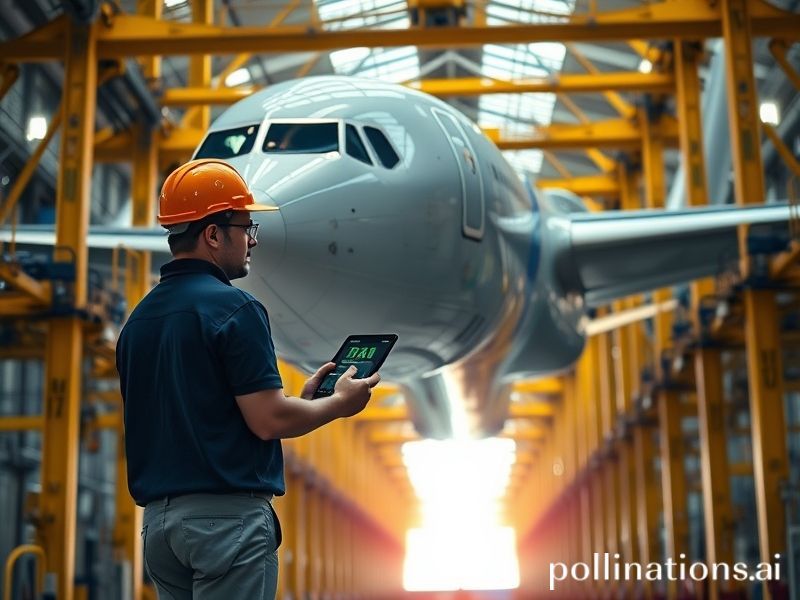Boeing’s Stock Is the World’s Most Expensive Mood Ring—and Everyone Wears It
Somewhere above the North Atlantic, a Boeing 787 is banking left in a holding pattern because the airline just realized it’s short one rivet certified for 0.0003 millimeters of tolerance. Down on the ground, the same missing rivet is making traders in London, Tokyo, and São Paulo twitch like overcaffeinated meerkats. Welcome to the global theater of BA stock—ticker BA, not to be confused with British Airways’ in-flight magazine, though both occasionally feature glossy photos of things that may or may not stay in the air.
Boeing’s share price has become the world’s most expensive mood ring. When a door plug blows out at 16,000 feet, the ring turns a tasteful shade of crimson from Wall Street to Dalal Street. When the FAA sighs and says, “Fine, but just this once,” the ring flashes a hopeful spring green. Meanwhile, 195 countries that have staked their aerospace supply chains on Boeing’s competence are left refreshing brokerage apps like teenagers waiting for concert tickets. It’s touching, really—nothing unites humanity quite like synchronized anxiety.
The international implications are deliciously absurd. Consider Japan: a country that trusts fax machines more than digital signatures is now forced to trust a Chicago-based conglomerate that can’t quite master the art of “bolt goes in hole.” European regulators, still nursing Brexit hangovers, have discovered a new hobby: publicly doubting American engineering while privately praying Airbus has enough spare parts. Even China—never one to miss a geopolitical punchline—is dangling the prospect of re-certifying the 737 Max in exchange for… well, nobody knows exactly, but Beijing’s shopping list usually starts with semiconductors and ends with a polite request for the Pacific Ocean.
Emerging markets are perhaps the bleakest comedy act. Airlines from Jakarta to Johannesburg ordered jets back when BA stock was above $400 and optimism came in economy-size jugs. Now they’re stuck with half-delivered fleets, pilots trained on simulators that still think MCAS is a French pastry, and creditors who’ve begun Googling “sovereign default etiquette.” The World Bank, ever the life of the party, recently classified Boeing delays as a “climate risk” because idling aircraft burn extra fuel while everyone waits for paperwork—proof that ESG metrics can weaponize even corporate incompetence.
And then there’s the supply chain, that Rube Goldberg contraption stretching from Wichita to Wrocław. Each fuselage section is a passport holder: Italian composites, Indian software, Swedish fasteners, and—because irony needs a visa too—Russian titanium that somehow slipped past sanctions like a oligarch’s yacht. When Boeing sneezes, 3,000 subcontractors catch a cold, proving that globalization is just a fancy word for “everybody shares the same migraine.” The result? A worldwide shortage of patience, disguised as a shortage of aircraft.
Of course, the stock itself remains a reliable barometer of collective delusion. Analysts in Hong Kong issue “buy” recommendations while simultaneously advising clients to pack a parachute. Retail traders on Reddit treat BA like a meme coin with wings: “If it can hold $170, next stop the moon!”—conveniently forgetting that Boeing already has prior experience with unscheduled lunar detours. Even the Saudis, who usually prefer their risk wrapped in oil futures, have taken a strategic stake, presumably on the theory that if anyone understands volatile crashes, it’s a country whose entire economy is a bet on the internal combustion engine.
So what does it all mean? Simply this: BA stock is no longer a company equity; it’s a planetary seismograph registering every tremor of late-stage capitalism. A single quarterly report can tank pension funds in Helsinki, delay GDP forecasts in Lagos, and force the president of the United States to pretend—yet again—that he flies coach. Until humanity invents teleportation or learns to love overnight trains, we’re all passengers on this flight, gripping armrests fashioned from our own credulity.
Buckle up. The seat-belt sign is sponsored by regulatory forbearance and may flicker without warning.







